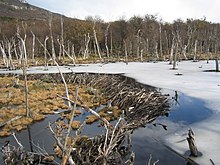Risk assessment of over-the-counter cannabinoid-based cosmetics: Legal and regulatory issues governing the safety of cannabinoid-based cosmetics in the UAE
| |
|
|
Ecology
|
|
Ecology (from Ancient Greek οἶκος (oîkos) 'house', and -λογία (-logía) 'study of') is the natural science of the relationships among living organisms, including humans, and their physical environment. Ecology considers organisms at the individual, population, community, ecosystem, and biosphere levels. Ecology overlaps with the closely related sciences of biogeography, evolutionary biology, genetics, ethology, and natural history. Ecology is a branch of biology, and is the study of abundance, biomass, and distribution of organisms in the context of the environment. It encompasses life processes, interactions, and adaptations; movement of materials and energy through living communities; successional development of ecosystems; cooperation, competition, and predation within and between species; and patterns of biodiversity and its effect on ecosystem processes. Ecology has practical applications in conservation biology, wetland management, natural resource management (agroecology, agriculture, forestry, agroforestry, fisheries, mining, tourism), urban planning (urban ecology), community health, economics, basic and applied science, and human social interaction (human ecology). The word ecology (German: Ökologie) was coined in 1866 by the German scientist Ernst Haeckel. The science of ecology as we know it today began with a group of American botanists in the 1890s. Evolutionary concepts relating to adaptation and natural selection are cornerstones of modern ecological theory. Ecosystems are dynamically interacting systems of organisms, the communities they make up, and the non-living (abiotic) components of their environment. Ecosystem processes, such as primary production, nutrient cycling, and niche construction, regulate the flux of energy and matter through an environment. Ecosystems have biophysical feedback mechanisms that moderate processes acting on living (biotic) and abiotic components of the planet. Ecosystems sustain life-supporting functions and provide ecosystem services like biomass production (food, fuel, fiber, and medicine), the regulation of climate, global biogeochemical cycles, water filtration, soil formation, erosion control, flood protection, and many other natural features of scientific, historical, economic, or intrinsic value. (Full article...) Selected article -Acclimatisation societies were voluntary associations, founded in the 19th and 20th centuries, that encouraged the introduction of non-native species in various places around the world, in the hope that they would acclimatise and adapt to their new environments. The societies formed during the colonial era, when Europeans began to settle in numbers in unfamiliar locations. One motivation for the activities of the acclimatisation societies was that introducing new species of plants and animals (mainly from Europe) would enrich the flora and fauna of target regions. The movement also sought to establish plants and animals that were familiar to Europeans, while also bringing exotic and useful foreign plants and animals to centres of European settlement. It is now widely understood that introducing species to foreign environments is often harmful to native species and to their ecosystems. For example, in Australia the environment was seriously harmed by overgrazing by rabbits. In North America house sparrows displaced and killed native birds. In New Zealand, introduced mammals such as possums and cats became threats to indigenous plants, birds and lizards. Around the world, salamander populations are threatened by introduced fungal infections. Consequently, the deliberate introduction of new species is now illegal in some countries. (Full article...)Selected image - Credit: User: Lamiot General imagesThe following are images from various ecology-related articles on Wikipedia.
Related WikiProjectsThings you can do
Entries here consist of Good and Featured articles, which meet a core set of high editorial standards.
 An invasive species is an introduced species that harms its new environment. Invasive species adversely affect habitats and bioregions, causing ecological, environmental, and/or economic damage. The term can also be used for native species that become harmful to their native environment after human alterations to its food web. Since the 20th century, invasive species have become a serious economic, social, and environmental threat worldwide. Invasion of long-established ecosystems by organisms is a natural phenomenon, but human-facilitated introductions have greatly increased the rate, scale, and geographic range of invasion. For millennia, humans have served as both accidental and deliberate dispersal agents, beginning with their earliest migrations, accelerating in the Age of Discovery, and accelerating again with international trade. Notably invasive plant species include the kudzu vine, giant hogweed, Japanese knotweed, and yellow starthistle. Similarly invasive animals include European rabbits, domestic cats, and carp. (Full article...)Selected biography -John Stanley Beard (15 February 1916 – 17 February 2011) was a British-born forester and ecologist who resided in Australia. Beard studied at the University of Oxford where he completed his doctoral thesis on tropical forestry. While working with the Forestry Division in Trinidad and Tobago during the 1940s, Beard developed a system of forest classification for Tropical America and described the forests of Trinidad, Tobago, and the Lesser Antilles; these descriptions remain standard references on the topics. (Full article...)Did you know (auto-generated)
Selected quote -
Ecology news
Additional News Highlights
Selected publication -African Invertebrates is a peer-reviewed scientific journal that covers the taxonomy, systematics, biogeography, ecology, conservation, and palaeontology of Afrotropical invertebrates, whether terrestrial, freshwater, or marine. African Invertebrates is currently published twice a year and accepts large revisionary works, as well as review papers and smaller contributions. (Full article...) Related portalsMore did you know -Related articlesAssociated WikimediaThe following Wikimedia Foundation sister projects provide more on this subject:
Web resources
Discover Wikipedia using portals |






























































